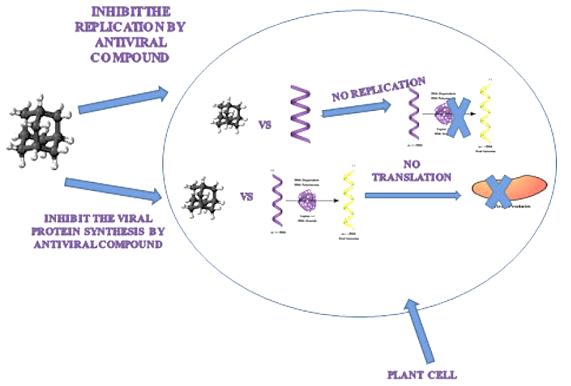Lifeasible focuses on developing environmentally friendly plant protection methods and provides services to help study the mechanism of natural metabolites in resistance to plant viruses for applying natural metabolites in plant protection.
Plant viral diseases are the second most important plant diseases after fungal plant diseases. The natural substances found against plant viruses include plant-derived, microbial-derived, and animal-derived substances. Most of these anti-viral substances belong to plant metabolites and microbial metabolites. The anti-plant virus activity of animal metabolites has not been studied much. Some oligosaccharides (e.g., chitosan and chitin) have been shown in the literature to have the ability to activate plant resistance to viruses. So far, the anti-plant virus mechanisms can be classified as reducing or preventing virus invasion, interfering with viral nucleic acid replication, interfering with viral protein synthesis, interfering with virus assembly, and stimulating the plant's anti-viral activity.
 Fig. 1 Action mechanism of antiviral compounds inside the plant cell (Ahsan et al., 2022).
Fig. 1 Action mechanism of antiviral compounds inside the plant cell (Ahsan et al., 2022).
Lifeasible helps to study the anti-viral mechanisms of natural substances in plants, and we focus on the anti-viral mechanisms of plant and microbial metabolites. Generally, we first help to define the broad direction of anti-viral mechanisms and then provide more detailed mechanistic studies based on the broad direction. For the analysis of anti-viral mechanisms of plant metabolites, we focus on the services of mechanisms that interfere with the synthesis of viral proteins, interfere with virus assembly, and interfere with the synthesis of viral nucleic acids. For the anti-viral mechanisms of microbial metabolites, we focus on the services of mechanisms that interfere with viral protein synthesis, interfere with virus assembly, interfere with viral nucleic acid synthesis, and stimulate plant anti-viral capability.
Using gene editing and Agrobacterium-mediated transient expression
Many protein metabolites (e.g., WUSCHEL, Dicer-like, and Argonaute endoribonucleases) have better anti-plant viral functions. We can provide gene-editing services for proteins in plant metabolites to help explore the specific anti-plant viral mechanism. In the case of proteins that interfere with viral nucleic acid synthesis, we can help discover the specific sites that play an interfering role. If it is a protein that interferes with viral protein synthesis, we can help discover whether it is caused by altered signaling pathways or by direct action on plant ribosomes. Furthermore, we also used Agrobacterium-mediated transient expression to help study the mechanism.
Combination of in vivo and in vitro experiments
The in vivo experiments will help to discover the mechanisms affecting viral nucleic acid synthesis, protein synthesis, and immune signaling regulation. In vitro experiments help to discover the mechanisms affecting viral assembly. We combine various in vivo and in vitro anti-viral mechanism experiments to help fully analyze the anti-viral mechanism of metabolites.
Combining plant immune mechanisms
In combination with the immune mechanisms of plants, the mechanisms of indirect anti-viral metabolites can be better studied. Our in-depth understanding of plant immune mechanisms can help to rapidly explore the mechanisms of metabolites regulating plant immune resistance to viruses, including signaling regulation and production of direct anti-viral substances.
Lifeasible is dedicated to supporting research on applying natural substances in plant protection to accelerate the development of environmentally friendly plant protection solutions. Here, we provide services on the mechanisms of protective effects of metabolites in resistance to plant viruses to help develop plant virus control solutions. In addition, we also provide services on anti-insect, anti-microbial and herbicidal mechanisms of natural metabolites. If you need any of the above services, please do not hesitate to contact us, and we guarantee to provide you with professional and attentive services.
References
Lifeasible has established a one-stop service platform for plants. In addition to obtaining customized solutions for plant genetic engineering, customers can also conduct follow-up analysis and research on plants through our analysis platform. The analytical services we provide include but are not limited to the following:
Why Do Plants Blush When They Are Hungry?
April 26, 2024
STU-CRISPR System Improves Plant Genome Editing Efficiency
April 19, 2024